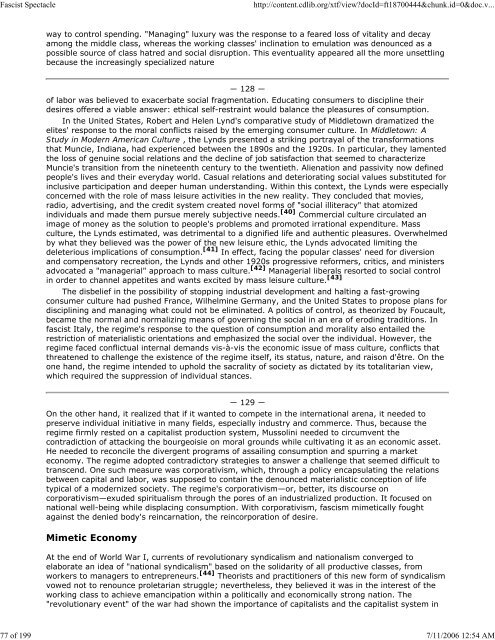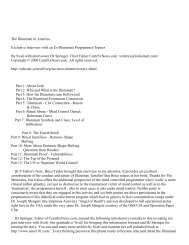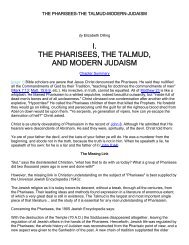You also want an ePaper? Increase the reach of your titles
YUMPU automatically turns print PDFs into web optimized ePapers that Google loves.
<strong>Fascist</strong> <strong>Spectacle</strong> http://content.cdlib.org/xtf/view?docId=ft18700444&chunk.id=0&doc.v...<br />
way to control spending. "Managing" luxury was the response to a feared loss of vitality and decay<br />
among the middle class, whereas the working classes' inclination to emulation was denounced as a<br />
possible source of class hatred and social disruption. This eventuality appeared all the more unsettling<br />
because the increasingly specialized nature<br />
― 128 ―<br />
of labor was believed to exacerbate social fragmentation. Educating consumers to discipline their<br />
desires offered a viable answer: ethical self-restraint would balance the pleasures of consumption.<br />
In the United States, Robert and Helen Lynd's comparative study of Middletown dramatized the<br />
elites' response to the moral conflicts raised by the emerging consumer culture. In Middletown: A<br />
Study in Modern American Culture , the Lynds presented a striking portrayal of the transformations<br />
that Muncie, Indiana, had experienced between the 1890s and the 1920s. In particular, they lamented<br />
the loss of genuine social relations and the decline of job satisfaction that seemed to characterize<br />
Muncie's transition from the nineteenth century to the twentieth. Alienation and passivity now defined<br />
people's lives and their everyday world. Casual relations and deteriorating social values substituted for<br />
inclusive participation and deeper human understanding. Within this context, the Lynds were especially<br />
concerned with the role of mass leisure activities in the new reality. They concluded that movies,<br />
radio, advertising, and the credit system created novel forms of "social illiteracy" that atomized<br />
individuals and made them pursue merely subjective needs. [40] Commercial culture circulated an<br />
image of money as the solution to people's problems and promoted irrational expenditure. Mass<br />
culture, the Lynds estimated, was detrimental to a dignified life and authentic pleasures. Overwhelmed<br />
by what they believed was the power of the new leisure ethic, the Lynds advocated limiting the<br />
deleterious implications of consumption. [41] In effect, facing the popular classes' need for diversion<br />
and compensatory recreation, the Lynds and other 1920s progressive reformers, critics, and ministers<br />
advocated a "managerial" approach to mass culture. [42] Managerial liberals resorted to social control<br />
in order to channel appetites and wants excited by mass leisure culture. [43]<br />
The disbelief in the possibility of stopping industrial development and halting a fast-growing<br />
consumer culture had pushed France, Wilhelmine Germany, and the United States to propose plans for<br />
disciplining and managing what could not be eliminated. A politics of control, as theorized by Foucault,<br />
became the normal and normalizing means of governing the social in an era of eroding traditions. In<br />
fascist Italy, the regime's response to the question of consumption and morality also entailed the<br />
restriction of materialistic orientations and emphasized the social over the individual. However, the<br />
regime faced conflictual internal demands vis-à-vis the economic issue of mass culture, conflicts that<br />
threatened to challenge the existence of the regime itself, its status, nature, and raison d'être. On the<br />
one hand, the regime intended to uphold the sacrality of society as dictated by its totalitarian view,<br />
which required the suppression of individual stances.<br />
― 129 ―<br />
On the other hand, it realized that if it wanted to compete in the international arena, it needed to<br />
preserve individual initiative in many fields, especially industry and commerce. Thus, because the<br />
regime firmly rested on a capitalist production system, Mussolini needed to circumvent the<br />
contradiction of attacking the bourgeoisie on moral grounds while cultivating it as an economic asset.<br />
He needed to reconcile the divergent programs of assailing consumption and spurring a market<br />
economy. The regime adopted contradictory strategies to answer a challenge that seemed difficult to<br />
transcend. One such measure was corporativism, which, through a policy encapsulating the relations<br />
between capital and labor, was supposed to contain the denounced materialistic conception of life<br />
typical of a modernized society. The regime's corporativism—or, better, its discourse on<br />
corporativism—exuded spiritualism through the pores of an industrialized production. It focused on<br />
national well-being while displacing consumption. With corporativism, fascism mimetically fought<br />
against the denied body's reincarnation, the reincorporation of desire.<br />
Mimetic Economy<br />
At the end of World War I, currents of revolutionary syndicalism and nationalism converged to<br />
elaborate an idea of "national syndicalism" based on the solidarity of all productive classes, from<br />
workers to managers to entrepreneurs. [44] Theorists and practitioners of this new form of syndicalism<br />
vowed not to renounce proletarian struggle; nevertheless, they believed it was in the interest of the<br />
working class to achieve emancipation within a politically and economically strong nation. The<br />
"revolutionary event" of the war had shown the importance of capitalists and the capitalist system in<br />
77 of 199 7/11/2006 12:54 AM









